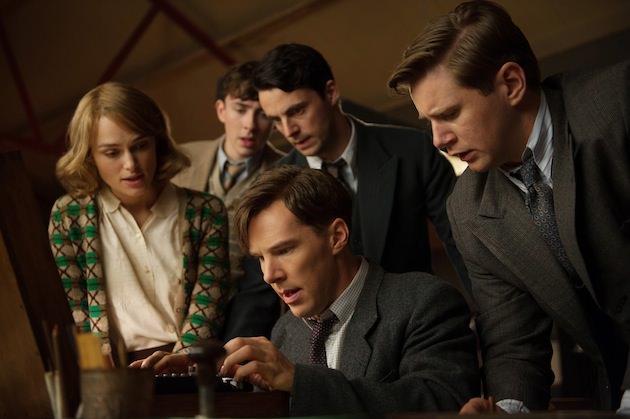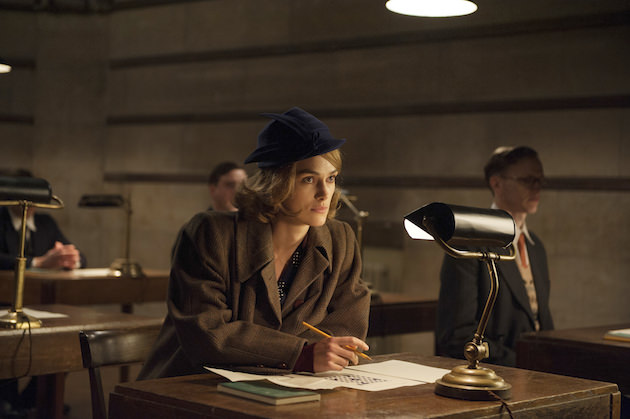Music for the Mind: Composer Alexandre Desplat on The Imitation Game
Composer Alexandre Desplat has been nominated for six Academy Awards, starting with his work on The Queen in 2006. He bookended his take on the music beneath royal narratives with his nomination for The King’s Speech in 2010. He’s also the man behind the score for franchise blockbusters (Harry Potter and the Deathly Hollows, The Twilight Saga: New Moon), international sagas (Zero Dark Thirty, Argo, for which he earned his sixth Oscar nom in 2012) and some forty-plus other films in his long, acclaimed career.
This year alone Desplat has worked on five major films; George Clooney’s The Monuments Men, Wes Anderson’s The Grand Budapest Hotel, Gareth Edwards’ Godzilla, Angelina Jolie’s Unbroken and Mortem Tyldum’s The Imitation Game.
It’s the latter film we spoke to Desplat about, which covers mathematician and logistician Alan Turing’s efforts, along with an assembled team of linguists, a chess master, intelligence officers and scholars to break the German’s seemingly unbreakable Enigma code during World War II. The Imitation Game also covers an ealry relationship that shaped Turing forever, and what happened to Turing after the war; namely, the way in which his own government mistreated this war hero who was partly responsible for saving the lives of millions of people.
Played superbly by Benedict Cumberbatch, the film offers up both a largley unknown history of our most cinematically portrayed war and a performance that captures the brilliance, and prickliness, of a vastly misunderstood genius. Turing wasn’t just a genius under enormous pressure at the very worst part of the war; he was also a gay man living in a country that treated them little different then they did during Oscar Wilde’s days. There are three major time periods represented in the film, and they are not laid out chronologically; we start off with Turing’s interview at Bletchley Park (the United Kingdom’s headquarters for their Government Code and Cypher School, where they worked night and day to crack the secret communications of the Axis Powers), and then the film travels back and forth between the war, his dealings with the police after the war, and his school days, where he meets his first love, a sweet, protective boy named Christopher.

Desplat was approached a few weeks before production ended and asked to provide a score that would thread itself through these three disparate time periods in Turing’s life. “There’s just so many layers of the storyline,” he says, “it’s extremely nuanced, you follow this character on several journeys; of course there’s the war, the Enigma code, but there’s also the trauma that follows the war, and, there’s a complex structure with flashbacks and flash forwards, so the music really needed to focus on him and keep all these elements within one theme.”
One of the pitfalls of making a film about a genius is short of throwing a bunch of equations up on the screen and clogging your film with scenes of someone madly solving them on huge blackboards, it’s tough to bring across brilliance. We’re talking about Einstein-level genius here, the stuff of A Beautiful Mind and, just this year, The Theory of Everything. Filmmakers must rely on other methods for showcasing this level of intellect outside of just performance and special effects. This can be through production design, like Maria Djurkovic’s work on the electro-mechincal code-breaking machine Turing builds to break the Enigma code; it can be shown through the sequencing of scenes through the work of editor Billy Goldenberg; or, through something more emotional and ephemeral, like Desplat’s score.
“I wanted to bring out that extremely brilliant, genius brain of Turing’s, when he’s scribbling or doing equations, but not talking, and to do that we used a mix of orchestra and computerized sequences of channels,” Desplat says. “I think this mix captures his heroism and what he achieved.” Desplat went on to say that not only did Turing help break the Enigma code, he essentially invented the computer in the process.
Desplat recorded with the London Symphony, and his opening score introduces the viewer into the world of The Imitation Game in a series of descending, rippling keyboard notes that reappear throughout the film.
In tracks like “Enigma,” Desplat and his players create sounds that call to mind the pinging of sonar, which speaks to the Enigma code’s ability to keep German U-Boats hidden beneath the waves, unharassed as they sent warships and transport vessels alike to the bottom of the sea.
A track entitled “Crossword” (crossword puzzles factor crucially into the film), is a complex arrangement of instruments and sound meant to evoke Turing’s mind.

Turing’s machine, named Christopher in the film (after that first childhood love we see flashbacks of throughout the film), based on the real life Bombe, was a musical instrument itself; upon its completion, the machine hums and pounds with an almost martial percussive beat. “When I heard the sound from the wheels turning, we added this electronic sound on top of that pounding sound,” Desplat says. "We wanted to bring excitement and suspense and danger and expectation to that sound, as it’s a very important moment in the film.”
When asked how he approached The Imitation Game versus another of his recent films about international intrigue, Argo, Desplat said that although the two share this theme of people in peril needing to be saved, Turing’s story was on a much more epic scale, yet the film really was centered on a single individual and his journey. “The Imitation Game is about saving millions of people during the war, but I had to focus on him, so the score is very intimate and follows his emotions, his journey,” he says. “The orchestra can play the larger drama of the story, which is the war, but the score really had to be focused on something very intimate within Benedict’s character. You have a man whose plugged into this crazy period.” Quite literally, in fact.
Some scores will feature a signature instrument for a character, subliminally signaling to the audience his arrival in a scene. For The Imitation Game, Turing is in just about every single scene, and Desplat steered away from giving him his own specific theme. “The only theme would be the relationship between Alan and Christopher when they’re children, the rest of the film, and the main theme itself, is about is Alan Turing,” Desplat says.
We tried to get a little scoop on Desplat’s next World War II film, Angelina Jolie’s Unbroken. “It’s completely different from The Imitation Game, a totally different energy,” he says. “We follow the story of the survivor [Louis Zamperini, played by Jack O’Connell], and the music is just going to give us a sense of the extraordinary power that he has as a man to survive these atrocities, these horrible wounds and horrible moments, and how he always manages to stand up. The music plays with very a powerful orchestra, without overwhelming the story. It’s a very spiritual quest and the music follows that.”
As for Cumberbatch’s Alan Turing, Desplat says, “He is the story. The war is almost a pretext to tell his story, as it encompasses what he’s doing. The way he puts his whole self into the world, how he deals with it, that’s the film.”



